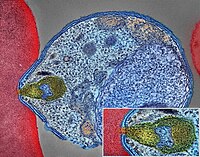
Photo from wikipedia
OBJECTIVE To explore the possible association between polymorphisms in CD1 genes and both asymptomatic and mild Plasmodium falciparum infection. METHODS Two clusters of 85 school children, from the village of… Click to show full abstract
OBJECTIVE To explore the possible association between polymorphisms in CD1 genes and both asymptomatic and mild Plasmodium falciparum infection. METHODS Two clusters of 85 school children, from the village of Dienga (Gabon) were investigated. The first group was analysed for the prevalence and the multiplicity of asymptomatic P. falciparum infection, whereas the second group was screened for the frequency of malarial attacks. RESULTS Our findings showed that homozygosity for the CD1E*02 allele was associated with a low frequency of malarial attacks. Furthermore, a strong association between CD1E*02 homozygotes and the resistance to multiple malarial attacks was identified. The CD1A*01 allele showed a weak association with a small number of malarial attacks. CONCLUSION Our results suggest a possible role of CD1E polymorphisms in malaria protection among school children and that CD1e molecules are involved in anti-malarial immunity.
Journal Title: Asian Pacific journal of tropical medicine
Year Published: 2017
Link to full text (if available)
Share on Social Media: Sign Up to like & get
recommendations!